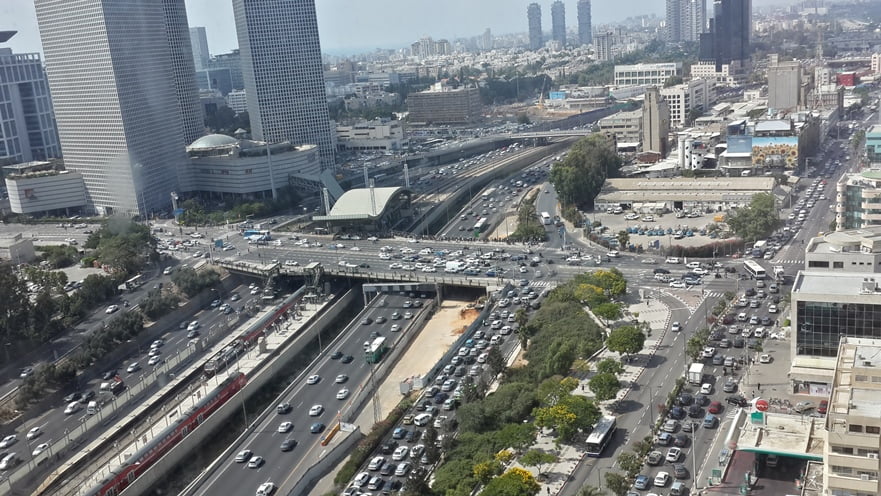A majority of Israelis are unhappy with their work-life balance – the balance between time allocated for their job/career and private lives – and spend on average 25 hours per month sitting in traffic jams while commuting to their places of work, according to a new report by the Israel Democracy Institute (IDI).
The survey, conducted last month with 600 participants of working age (over 18) who constitute a representative sample of the adult Israeli population, found that 57 percent of Israelis are dissatisfied with their existing work-life balance.
The survey also found that 55 percent said that they do not have the flexibility to work from home, while just five percent stated that they have the freedom to decide whether or not to work from home. Thirty-six percent of respondents said that they could work from home only in certain cases (with permission from superiors, for example).
Of those who do go into work, 31 percent said it takes them between a half an hour to an hour and 29 percent said between one to two hours. Eleven percent said the commute to and from their workplace is over two hours, and only 29 percent of employees said it takes them up to a half an hour to get to work every day.

“In terms of productivity, this results in 25 wasted work hours per month – three full days that the economy loses every month. In annual terms, this is around 36 working days per year, which is about 13 percent of the total annual working days in the economy,” the IDI wrote in the report.
Traffic congestion is a notorious problem in Israel. The country has a population of around nine million people and transportation is largely based on the use of private cars, which creates massive traffic jams particularly in the center – Israel’s economic hub. In fact, Israel has the highest road congestion of any OECD country by a wide margin, according to OECD figures from 2014. The public transit infrastructure, meanwhile, lags behind other developed countries in the OECD by about 25 years, according to a 2014 study by the Knesset Research and Information Center. There are ongoing projects to address this issue, but with Israel facing a third national election in under a year, it is unclear where efforts stand.
The Finance Ministry has estimated that the annual economic damage caused by traffic congestion stands at some NIS 35 billion annually. According to the OECD, Israel’s costs of congestion are estimated at around two percent of GDP, “above levels in other high-income economies.”
A love of work?
Israelis may feel an imbalance between their work lives and personal lives, but a majority, close to 70 percent of respondents, said they attribute more importance to their work, according to the IDI report. Just 33 percent said their work lives held less weight.
Forty-seven percent said they work additional hours from home on a weekly basis, and around 80 percent also said that they use their cell phones for an average of one hour a day to deal with work-related matters after work.
Forty percent of respondents said that they work even when they are on sick leave and 27 percent indicated that they often or always work during vacation or holidays. The rate of employees who said they work even when sick or on holiday varied according to their income and was high among those whose income is above average, the IDI survey showed.

In response to various initiatives to shorten the workweek in Israel, which runs Sunday-Thursday with Fridays off, the majority of the employees – 62 percent – said they preferred to leave the situation as is, with 38 percent of respondents saying they would prefer working on Friday with a day off Sunday. The latter is largely the model in Western countries.
The average workday in Israel is 8.6 hours with a weekly average of 42 hours, which is higher than the average for OECD countries.
But despite the many hours spent working, the average labor productivity – the ratio of gross domestic product to total hours worked – in Israel is relatively low and has remained low for many years, according to multiple studies. This is despite the country’s thriving, vibrant high-tech sector which is considered a world-leader in many fields.
Separate economies
The problem, according to the Taub Center, a socio-economic research institute, problem lies in the “exceptionally large gap in the Israeli labor market between the size of the high-tech and other export-intensive sectors, which are characterized by high wages and rapid growth, and the rest of the market with its low salaries and slow growth.”
Sign up for our free weekly newsletter
SubscribeAccording to a 2019 Bank of Israel report titled “Increasing the Standard of Living in Israel by Increasing Labor Productivity,” the gap is also due to “lags in the level of infrastructure and in business capital, and a lack of improvement “in the areas of regulation and bureaucracy.”
The Israeli high-tech sector accounts for just eight percent of total employment in the country, but it is the most important part of the economy, producing about one-fourth of income tax payments in Israel and accounting for a major portion of the added value of Israeli exports, according to a State of the Nation Report 2018 by the Taub Center.
However, the average skill level among workers in Israel is lower than the OECD average, especially among the ultra-Orthodox and the Arab-Israeli communities. Compared with the very high skills of Israel’s tech workers, the resulting gap is “among the largest in the OECD.”
Consequently, there is very little mobility between the two groups which has led to the development of two separate economies, according to the research center, and a severe shortage of skilled workers estimated at some 15,000.
Brain drain
One of the root causes of this is Israel’s segmented education system.
“About a quarter of Israeli pupils are from the Arab communities where their math and science levels are below third-world. Then you have about a fifth of the children – those who are ultra-Orthodox – who do not study a core curriculum. Israel is the only developed country in the world that allows parents to deprive their children of a core curriculum,” Professor Dan Ben-David, a leading Israeli economist at Tel Aviv University, told NoCamels earlier this year. In the periphery too, outside central Israel, the education system is also inferior.
SEE ALSO: Israel’s Accelerating Brain Drain Should Be Ringing Alarm Bells, Says New Report
Professor Ben-David authored a report this summer as head of the Shoresh Institution for Socioeconomic Research that showed an alarming brain drain phenomenon.
According to the report titled “Leaving the Promised Land: A Look at Israel’s Emigration Challenge,” Israel’s most educated population is leaving the country at a pace that Ben-David says should “ring alarm bells in all of the corridors that determine Israel’s national priorities.”

The report showed that as Israel has become more integrated into the developed world, a rising share of its college graduates has been emigrating, particularly those with advanced degrees in exact sciences and engineering – who make up the foundation of Israel’s high-tech sector – physicians, and academic researchers.
Strategy needed
In a paper released this week ahead of the 2019 Eli Hurviz Conference on Economy and Policy in Jerusalem hosted by IDI, Professor Eugene Kandel who served as conference chair, wrote that in the absence of a long-term strategy to address these challenges in Israel, “we will almost surely fund ourselves in dire conditions within a decade or two.”
“The demographics of Israel are not sustainable, and without a smart long-term policy, this boat will capsize. The antiquated education system will produce people with antiquated skills unable to compete. Consequently, the high-tech sector that drives the Israeli economy may not be here a decade from now,” wrote Kandel, who is also CEO of Start-Up Nation Central, a non-profit organization that tracks the Israeli tech ecosystem.
Kandel said that the social security system may go bankrupt, the underfunded and underresourced medical system may collapse, and the movement of Israelis to the center of the country, depleting the periphery and clogging up roads, will continue.
“The resulting slowdown in economic growth can lead to our inability to defend ourselves or to continue to be seen as an attractive place to live for many of our most productive citizens,” he warned.
Related posts

Rehabilitation Nation: Israeli Innovation On Road To Healing

Israeli High-Tech Sector 'Still Good' Despite Year Of War





Facebook comments